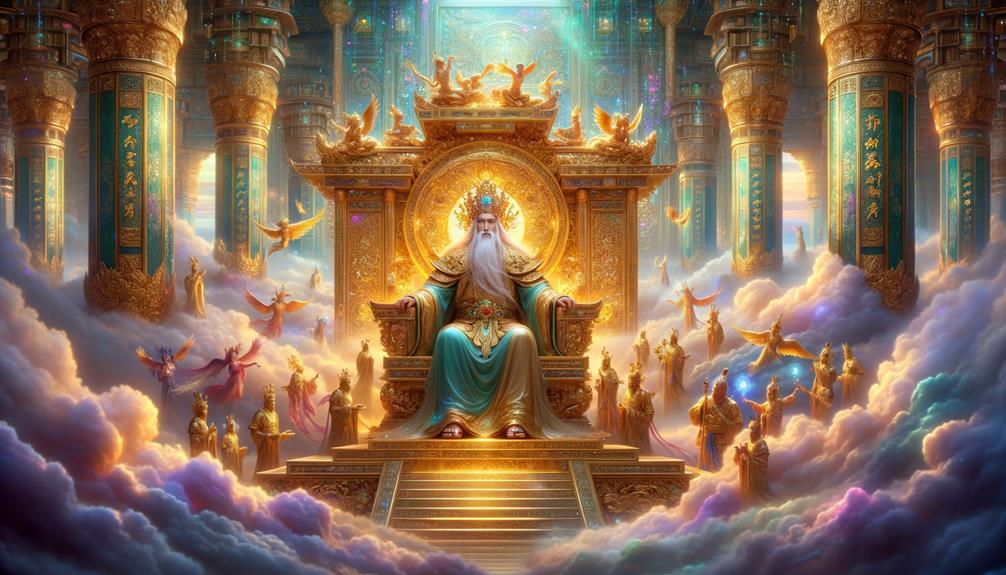As the Jade Emperor, I embody celestial wisdom and justice, overseeing cosmic harmony from my divine throne. My journey from humble beginnings to celestial sovereignty mirrors a heroic tale. I bridge the realms of Heaven, Earth, and the Underworld, maintaining balance alongside deities like Cheng Huang, Tu Di Gong, and Zao Jun, each protecting their respective domains.
My divine mandate is to oversee every cosmic and earthly affair. I summon the zodiac animals, shaping destinies and influencing lives. Followers honor me through offerings and festivals, celebrating the divine order I uphold. Learn more about the deities and rituals surrounding my eternal reign.
Origins and Mythology
The mythological origins of China's Jade Emperor can be traced back to the Zhou Dynasty, where a humble soldier named Zhang Denglai embarked on an extraordinary journey. Through his virtuous deeds and bravery, he caught the attention of celestial beings. One fateful night, a vision of Laozi revealed his divine destiny, sparking his ascension to godhood.
Zhang Denglai's transformation into the Pure August Emperor is steeped in symbolic tales. Some stories depict his birth as a miraculous event, setting him apart from ordinary mortals. As the Jade Emperor, he personified wisdom and justice, ruling alongside his wife Xiwangmu, the Celestial Queen Mother. Their union represented the harmonious balance of yin and yang, the fundamental forces of creation.
Zhang Denglai's rise from soldier to sovereign affirms the boundless potential within each individual. His hero's journey, etched in the cosmos, serves as a reminder that greatness can emerge from the most humble beginnings.
Role in the Celestial Court
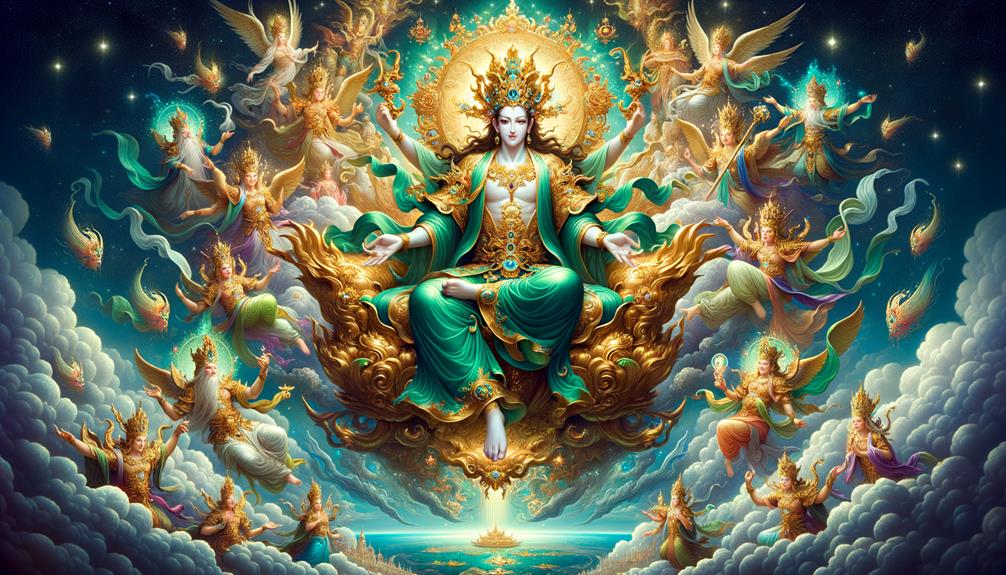
In the celestial realm, the Jade Emperor commands unparalleled authority. His divine decree maintains cosmic equilibrium, as deities fulfill sacred duties. Upholding order and justice, he epitomizes the archetypal cosmic ruler, guiding gods and mortals alike.
Supreme Authority Figure
The Jade Emperor governs all realms, exercising supreme control over Heaven, Earth, and the Underworld. As the celestial court's foremost figure, he oversees a vast bureaucracy, ensuring cosmic order persists across heavenly and earthly spheres. The Jade Emperor commands an assembly of civil servants and bureaucrats, each following the Golden Script's sacred guidance on rewards and remedies.
Within the heavenly court, the Jade Emperor's administrative role takes precedence. Specific deities, spirits, or gods oversee individual departments, carefully maintaining the cosmic equilibrium. This celestial hierarchy mirrors earthly kingdoms, with an army, royal family, and courtiers, all under the Jade Emperor's watchful eye.
Cheng Huang and Tu Di Gong assist in earthly matters, upholding order and prosperity in communities. Their roles reflect the Jade Emperor's far-reaching influence across dimensions, epitomizing his unrivaled leadership and divine mandate.
Heavenly Mandate Enforcement
Maintaining cosmic order and balance is a complex task overseen by the Jade Emperor, supreme ruler of the celestial realms. His governance mirrors earthly kingdoms, with a hierarchy of divine beings each assigned specific roles and duties. Ensuring justice reigns across heavenly and mortal domains falls under the Jade Emperor's purview.
This celestial bureaucracy isn't just symbolic; it's an active system upholding cosmic justice. Deities like Cheng Huang and Tu Di Gong serve as the Jade Emperor's trusted aides in earthly territories, ensuring communities thrive under divine order. Zao Jung, the Kitchen God, holds a pivotal position by reporting annually on human conduct, influencing the Jade Emperor's assessments of households and guiding his decisions.
Offerings made during Chinese New Year reflect reverence for the Jade Emperor's presence and hope for harmony and prosperity under his mandate. Ultimately, the Jade Emperor's oversight maintains the delicate celestial equilibrium, ensuring justice and order prevail across realms divine and mortal.
Divine Order Maintenance
At the apex of the heavenly realm stands the Jade Emperor, a celestial ruler who oversees the divine order with an unwavering hand. He governs through the sacred Jade Principles Golden Script, a celestial text that guides the distribution of rewards and remedies. Each decree from the Jade Emperor is a thread weaving the tapestry of cosmic harmony.
Mirroring earthly governance, a hierarchy of celestial bureaucrats and civil servants operates under the Jade Emperor's watchful eye. Specific deities oversee various aspects of life, ensuring meticulous management from the mundane to the miraculous.
Cheng Huang and Tu Di Gong, the Jade Emperor's earthly representatives, safeguard order and prosperity in human communities. Their vigilant oversight extends the Jade Emperor's influence into the mortal realm, upholding divine justice. Additionally, Zao Jun, the Kitchen God, serves as a celestial informant, filing annual reports on human conduct directly to the Jade Emperor. These reports guide the celestial ruler's judgments, maintaining the delicate balance of divine order.
Important Deities in His Court
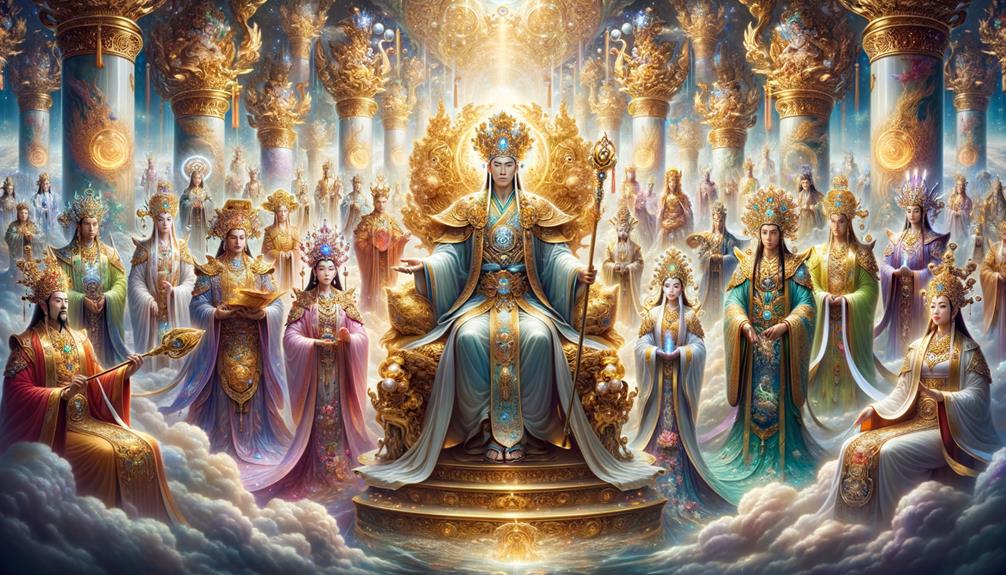
In the Jade Emperor's court, three key figures ensure harmony and order reign supreme: Cheng Huang, Tu Di Gong, and Zao Jun. Each upholds distinct realms that intertwine to create a well-balanced society.
Cheng Huang, the city god, stands as the ever-vigilant guardian of human settlements. His presence guarantees the security and stability necessary for communities to thrive and prosper. Turning to Tu Di Gong, this local deity nurtures the land and its inhabitants. Overseeing fields and villages, he safeguards the earth's bounties and the well-being of all.
Meanwhile, Zao Jun, the Kitchen God, plays a unique role. Annually ascending to the celestial court, he reports on the moral conduct of households, enabling the Jade Emperor to dispense justice and uphold virtuous living. These three deities form an intricate tapestry, their influences intertwining to orchestrate cosmic balance and earthly prosperity.
Influence on Chinese Zodiac
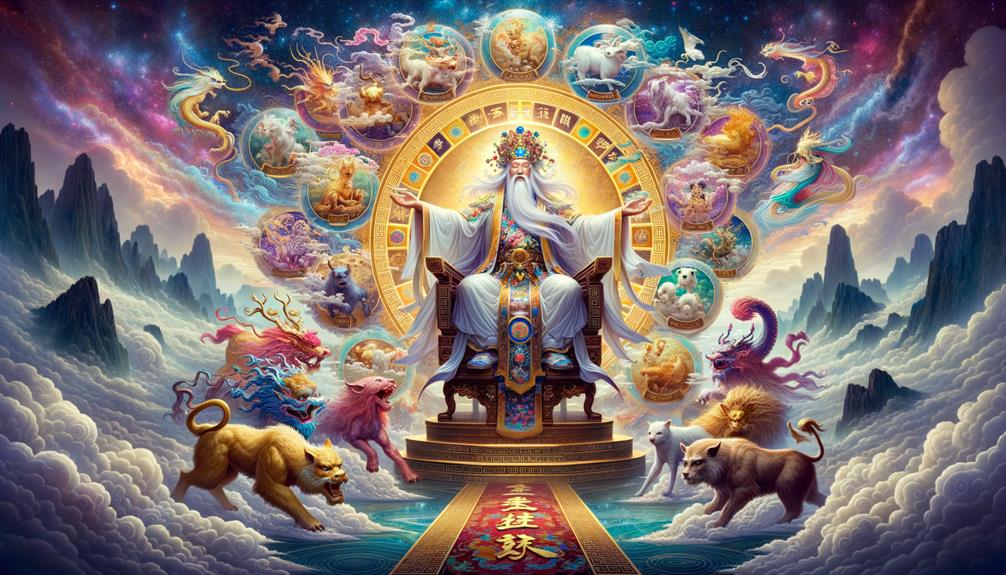
I witnessed the Jade Emperor summon twelve animals for a celestial race, their finishing order determining the zodiac cycle forevermore. This divine contest transcended arranging the calendar; it imbued each creature with distinct powers and predestined paths. Through timeless wisdom, the zodiac now illuminates our journeys, unveiling insights into fortune and compatibility.
Zodiac Animal Selection
The Chinese zodiac's rankings stem from an ancient race. The rat craftily hopped aboard the ox, leaping off at the finish to snag first place. The steadfast ox trailed close behind. The tiger's ferocity secured third, while the rabbit's agility earned fourth. Despite aiding others, the noble dragon still managed fifth. Through guile, the snake slithered into sixth, surprising the hard-charging horse in seventh.
Each creature's unique traits shaped their standing – the goat's gentleness, the monkey's wit, the rooster's punctuality, the dog's loyalty, and the pig's generosity rounded out the zodiac cycle. These characteristics influence those born under the corresponding animal signs, reflecting universal human qualities.
Annual Zodiac Cycle
The annual zodiac cycle doesn't just mark the passage of time – it reflects an ancient cosmic race ordained by the mythical Jade Emperor. In this legendary competition, each animal's finishing position revealed their fundamental traits, judged divinely.
The wily Rat won by hitching a ride atop the hardworking Ox, demonstrating resourcefulness. Though second, the Ox's diligence earned respect. The brave Tiger took third place, and so forth – each animal's rank mirroring their intrinsic virtues and foibles.
These finishing positions echo across generations, each zodiac animal's reign imbuing the year with distinct characteristics that shape destinies per ancient beliefs. The orderly cycle conveys harmony within the celestial realm and guides followers through the complexities of Chinese astrology's intertwined stories.
Cultural Zodiac Significance
The Chinese zodiac, a 12-year cycle where each year represents an animal, carries immense cultural significance in Chinese tradition. These animals symbolize distinct personality traits believed to shape one's destiny and journey through life.
| Zodiac Animal | Personality Traits |
|---|---|
| Rat | Quick-witted, Resourceful |
| Ox | Diligent, Reliable |
| Tiger | Brave, Confident |
| Rabbit | Gentle, Graceful |
| Dragon | Ambitious, Dynamic |
| Snake | Intuitive, Enigmatic |
| Horse | Energetic, Enthusiastic |
| Goat | Calm, Empathetic |
| Monkey | Clever, Inquisitive |
| Rooster | Observant, Hardworking |
| Dog | Loyal, Honest |
| Pig | Generous, Compassionate |
These archetypal symbols, interwoven with astrology, paint a vivid picture of how one's birth year influences their path. The Jade Emperor's choices resonate across generations, embedding the zodiac in everyday life and celestial narratives, reminding us of ancient wisdom guiding our fortunes.
Worship and Festivals
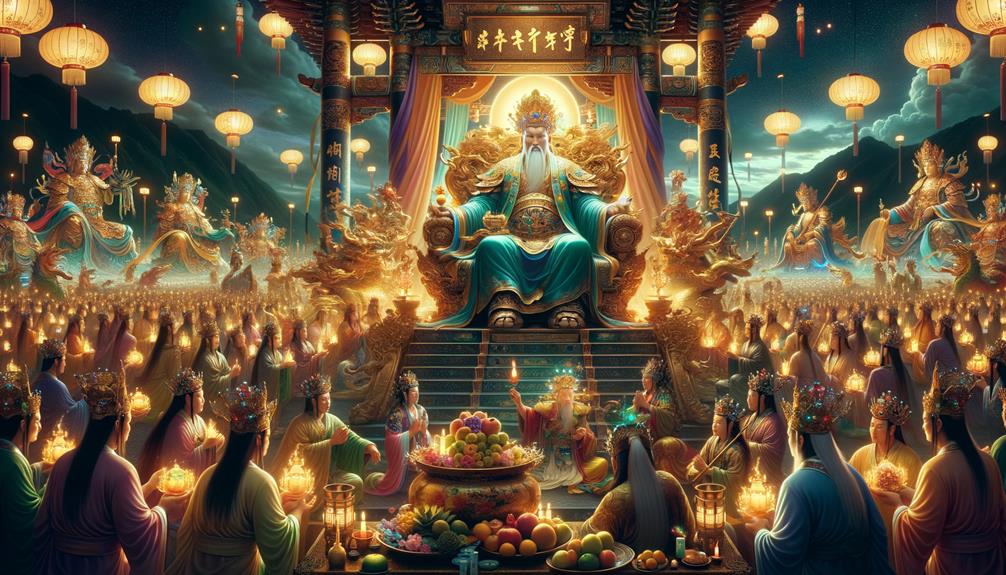
Celestial rhythms guide our community in honoring the Jade Emperor through lively rituals and sincere offerings. During Chinese New Year, we focus on the celestial court of this Heavenly Grandfather. On the first lunar month's ninth day, we celebrate his birthday wholeheartedly. Elaborate ceremonies and offerings mark this special occasion, seeking the Jade Emperor's blessings for prosperity.
Our worship encompasses various rituals:
- Incense and Prayers: We light incense sticks, sending prayers heavenward.
- Food Offerings: Plates of fruits, sweets, and delicacies are presented as offerings.
- Spirit Money: Special paper money featuring the Jade Emperor is burned for wealth and success.
- Temple Ceremonies: Temples dedicated to the Jade Emperor host ceremonial chants and hymns.
These rituals connect us to the divine realm and celestial court. Through this veneration, we honor the Heavenly Grandfather, seeking his guidance and protection to ensure a blessed year under celestial favor.
Representation in Popular Culture
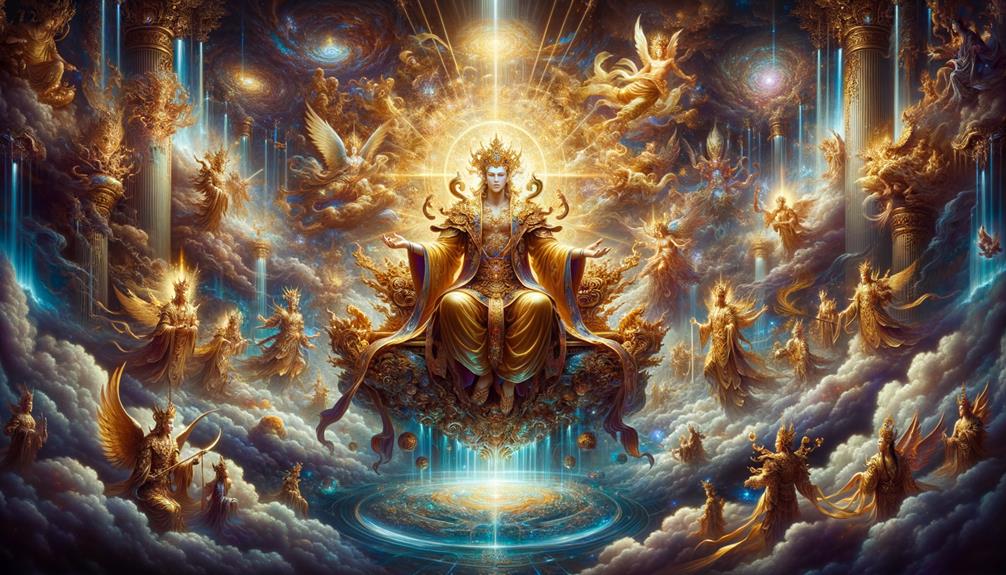
The Jade Emperor's legacy extends far beyond sacred rituals, seeping into contemporary entertainment as a formidable character. In the video game Smite, players command his celestial powers as a playable deity, bridging ancient myth and modern gaming. Role-playing adventures like Advanced Dungeons & Dragons weave his symbols into heroic quests, casting him as a wise yet stern overseer.
Television series like Stargate SG-1 referenced the Jade Emperor's celestial authority, underscoring his cross-cultural resonance. Even the cosmos pays tribute; a crater on Saturn's moon Rhea bears his name, solidifying his enduring influence across realms.
Through these portrayals, the Jade Emperor remains an indelible presence in our shared imagination, a celestial ruler whose reign transcends the heavens themselves.
Frequently Asked Questions
Is the Jade Emperor Good or Bad?
The Jade Emperor maintains order in the cosmos through his judicious rulings. His decrees reward ethical conduct and censure wrongdoing, guiding us along life's journey. While firm, his actions stem from a place of righteousness.
What Are Some Interesting Facts About the Jade Emperor?
The Jade Emperor captivates with his archetypal wisdom and authority. His celestial court resembles human governance structures, and tales like 'The Seamstress and the Cowherd' highlight his pivotal mythological role. He embodies traditions and narratives woven into Chinese culture over millennia. The Jade Emperor represents enduring philosophies, virtues, and legends passed down through generations, shaping beliefs and customs. His myths unveil moral lessons, societal values, and humankind's relationship with the cosmos. The Jade Emperor's legends offer profound insights into Chinese heritage.
Is the Jade Emperor the Most Powerful God?
You won't find a mightier deity than the Jade Emperor in the celestial hierarchy. His domain extends over Heaven, Earth, and the Underworld, with divine bureaucrats upholding his rule. This supreme authority maintains cosmic balance, making the Jade Emperor the ultimate divine power.
How Does the Jade Emperor Punish the Dragons?
I transformed the dragons into rivers, forcing them to serve humanity and the environment. Their once celestial forms turned into flowing waters, symbolizing my authority to maintain balance and fairness. This punishment ensures they will forever safeguard the lands and its inhabitants.

